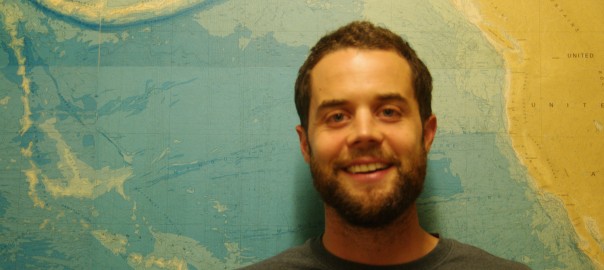Darwin’s Greg Britten awarded prestigious fellowship providing funding to pursue research on fundamental problems in marine microbial ecology.
Reporting by Helen Hill for the MIT Darwin Project
It was recently announced that Greg Britten, a postdoc working with Prof Mick Follows, has been awarded one of ten 2019 Simons Postdoctoral Fellowships in Marine Microbial Ecology.
Greg receives the award to study the macromolecular dynamics of phytoplankton growth in response to submesoscale environmental variability.
The growth of marine phytoplankton drives the productivity of marine ecosystems and plays a major role in Earth’s carbon cycle and climate. While the structure and function of phytoplankton populations have been characterized and modeled with success at large scales (>100 km, >10 days), the ecological impact and integrated role of smaller yet highly energetic submesoscale processes (0.1-10 km, ~0.1-10 days) remain poorly understood.
With this in mind, Britten plans to combine a new high-resolution Lagrangian (particle-tracking) ocean simulation infrastructure with field observations, targeted experiments, and models of individual macromolecular dynamics to better understand the impact of submesoscale variability on the diversity, stoichiometry, and productivity of marine ecosystems.
“In particular I plan to extend the existing ‘Darwin’ ocean model framework to accommodate submesoscale Lagrangian analysis allowing us to describe the submesoscale environment experienced by individual phytoplankton,” Britten explains. “Simulations will then be validated by comparison with high-resolution field observations from the North Pacific Gradients transect.”
Britten plans to use the Lagrangian model to drive the growth and macromolecular composition of individual phytoplankton using models of macromolecular cellular physiology, with targeted experiments conducted to probe the physiological response of phytoplankton to characteristic environmental fluctuations found in the submesoscale Lagrangian analysis.
“My goal with this project is to advance our theoretical and predictive understanding of phytoplankton growth processes in the ocean by bridging the gap between large scale ocean ecosystem structures and the dynamic growth conditions experienced by individual organisms,” says Britten.
Britten holds a PhD in Earth System Science and Oceanography from the University of California, Irvine, where he studied the cycling of carbon and nutrients in the ocean with Francois Primeau. Before his PhD, Britten completed a BSc in statistics and an MSc in biology at Dalhousie University in his hometown of Halifax, Canada, melding the two disciplines in work focused on quantifying large scale trends in the productivity of global fish stocks.
A complete list of the award recipients and their projects is available at the Simons Foundation website.
The Simons Foundation exists to advance the frontiers of research in mathematics and the basic sciences. Its Life Sciences division supports basic research on fundamental questions in biology. The division currently focuses on origins of life, microbial oceanography, microbial ecology and evolution, and support of early-career scientists.
Story image credit: Helen Hill
Related
Congratulations to Simons Postdoctoral Fellow B.B. Cael Darwin News
Artificial Intelligence Helps Manage Global Fisheries Darwin News
